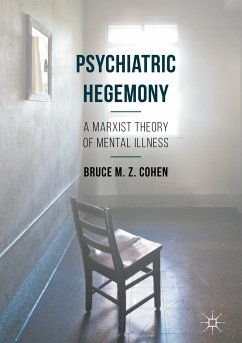Dieser Download kann aus rechtlichen Gründen nur mit Rechnungsadresse in A, B, BG, CY, CZ, D, DK, EW, E, FIN, F, GR, HR, H, IRL, I, LT, L, LR, M, NL, PL, P, R, S, SLO, SK ausgeliefert werden.
Hinweis: Dieser Artikel kann nur an eine deutsche Lieferadresse ausgeliefert werden.
"Psychiatric Hegemony explains how and why psychiatric discourse escaped from the clinic and spread throughout the masses to achieve hegemonic status in neo-liberal society. ... Psychiatric Hegemony will inspire a wide range of scholarship that informs both the social and biological sciences, and that will one day perhaps even make a difference to the health and well-being of diverse populations worldwide." (Paul H. Mason, Social History of Medicine, Vol. 31 (1), February, 2018)
"In Psychiatric Hegemony, Bruce Cohen offers a critical analysis of the mental health system ... . Cohen joins with other voices in calling for a system that provides necessary, humane help to those in need, and that exists to serve those in need ... . These objectives seem worthwhile, and perhaps this volume will engage others in thinking outside the sociocultural box as well." (Andrew Nocita, PsycCRITIQUES, Vol. 62 (25), June, 2017)









